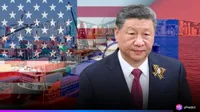
China is preparing for an unprecedented economic and military escalation. In a shocking strategic step, Beijing has announced sanctions on $120 billion of imports associated with US-Taiwan trade. These targets include electronics, semiconductors, and complex machinery that are co-manufactured by US and Taiwan-based businesses. This action appears to be the first phase of a larger, ultimately military campaign against Taiwan.
Beijing’s inflammatory posture demonstrates a significant departure from a diplomatic approach to a direct confrontation approach. By targeting US-connected businesses that operate near Taiwan and in the South China Sea, it may hope to wean Taiwan from the US’ protective infrastructure without firing a shot – at least not at first. This new approach, if economic warfare can threat the same as war, may be preparation for something much more dangerous.
Beijing’s Sanctions Strategy: Economic Shock Before Military Strike
The Chinese government reportedly finalized plans to cripple businesses connected to the US-Taiwan trade corridor. The goal is to paralyze the island’s economic resilience and strategic supply chains. China’s sanctions would include strict import restrictions, blacklisting of US-affiliated firms, and punitive tariffs across several sectors.
By leveraging trade as a weapon, China aims to inflict long-term economic damage without the immediate consequences of direct conflict. These actions also aim to divide Western support by making business operations in Asia riskier for American firms. This strategy could also force some corporations to relocate or scale down operations, isolating Taiwan even further.
Why $120 Billion in Trade Matters Right Now
The trade between the US and Taiwan is vital for global semiconductor supply. Taiwan’s chip-making capacity powers everything from smartphones to fighter jets. The proposed China sanctions could disrupt the global tech supply chain and raise prices worldwide. American tech giants like Apple, Nvidia, and Qualcomm may face severe delays and losses.
China has chosen the $120 billion trade volume strategically. This number represents high-tech goods where US and Taiwanese cooperation is the strongest. Cutting this trade directly hits Taiwan’s economic lifeline and sends a message to Washington: back down, or face massive disruptions.
South China Sea: China Expands Economic Pressure Points
Apart from the sanctions, China is stepping up military and economic surveillance in the South China Sea. Reports suggest Beijing will begin targeting ships and supply chains linked to US corporations operating in the region. The South China Sea plays a crucial role in Taiwan’s access to fuel, resources, and international trade.
With naval blockades and drone surveillance, China could soon choke Taiwan’s shipping lanes. This pressure tactic, combined with sanctions, may be designed to weaken Taiwan to a point where an invasion could succeed with minimal resistance.
Economic Warfare Sets the Stage for Conflict
These economic measures form a broader strategy that experts call “gray-zone warfare.” This approach blends economic pain, digital disruption, and physical intimidation before formal conflict. Sanctions on US-Taiwan trade are just one part of this plan.
China expects the economic fallout will lessen confidence at home in Taiwan, and damage international alliance cohesion. The longer Taiwan suffers economically, the more Beijing believes it can pressurize the island to submit or agree with its terms for reunification.
Global Reactions and High Stakes
Global markets are already responding to the news. Semiconductor stocks fell as traders prepare for disruptions in chip supply. The White House condemned the planned China sanctions and alerted Beijing that this action will further undermine stability in the Indo-Pacific region. Meanwhile, Taipei is calling on allies to prioritize an economic and military deterrent.
Japan, Australia, and the European Union are all closely monitoring the situation. Many suspect if either military or economic escalation occurs, it might have a domino effect and other nations will be dragged into the conflict. The fate of the US-Taiwan trade relationship and the future of the global economy are now at stake.







